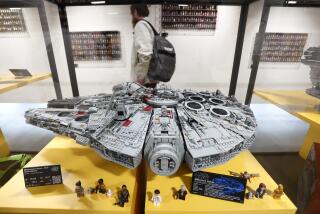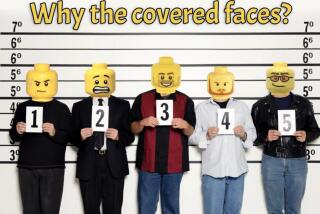Mattel issues a third toy recall
Mattel Inc. launched another major recall late Tuesday, its third in five weeks, adding more than 840,000 items containing unsafe amounts of lead paint to the list of the millions of Chinese-made toys it has pulled.
The recall of 11 different toys worldwide covers three sold under the Fisher-Price name and eight from the Barbie line, the El Segundo-based company’s biggest and best-known brand.
No injuries have been reported.
“We kept the promises we made last month when these issues surfaced: I said we were going to look hard at all the toys produced by vendors,” Mattel Chief Executive Robert Eckert said in an interview. “We said we would promptly notify people if we found something and now, unfortunately, we have.”
A spokeswoman for the U.S. Consumer Product Safety Commission said Mattel acted after conducting a “top-to-bottom inventory of children’s products.”
Mattel and the agency had planned to announce the recall today but made it public Tuesday after the Associated Press reported that Mattel was going to make the withdrawal.
More than 500,000 items shipped to stores in the U.S. as long ago as August 2006 and as recently as last month are affected. Mattel said that people who may have purchased tainted toys should check the company’s website at www.service.mattel .com or call (888) 496-8330 to find out whether they own any of the products and get instructions about returning items and receiving replacements.
A spate of recalls of toys made in China has sent manufacturers, retailers, federal agencies and politicians scrambling to restore shoppers’ confidence about consumer products -- particularly the 80% of U.S. toys that are made in China -- just before the biggest shopping season of the year. Lawmakers have demanded better oversight and more company accountability.
Mattel’s stock has fallen about 7% since it announced its first recall Aug. 1. Shares closed at $21.97 on Tuesday, up 34 cents.
Eckert said that Mattel’s new testing system, which includes the monitoring of paint used in factories as well as the testing of every batch of toys the company ships to stores, should reassure consumers.
“The toys people are going to buy this holiday season are safe, and we’re working hard to ensure that,” Eckert said.
Mattel stressed that Barbie dolls themselves were safe. But tests conducted after lead-paint recalls last month led to the discovery that eight Barbie-themed play sets -- including the Dream Puppy House and the Dream Kitty Condo -- had “impermissible levels of lead,” the company said.
The recalled Barbie items were made by Holder Plastics Co., a Mattel vendor that subcontracted painting work to the Dong Lian Fa and Yip Sing factories in China, which used uncertified paint, Mattel said. The company said it would no longer do business with those factories.
The recalled Fisher-Price products are a bongo band set from the “It’s a Big Big World” line and two GeoTrax locomotive toys.
In the case of the GeoTrax products, Mattel said that Apex Manufacturing Co. supplied the Boyi Plastic Products Factory in China with Mattel-certified paint but that the factory -- which has since gone out of business -- used uncertified paint.
The bongo band products were manufactured by the Shun On Factory, which outsourced the molding and painting of one plastic piece to the Jingying Tampo Printing Processing Factory, which, again, used uncertified paint, Mattel said.
In June, toy maker RC2 Corp. recalled 1.5 million Thomas & Friends wooden train toys, also imported from China, because of possible lead paint. Two weeks ago four companies recalled more than 340,000 Chinese-made toys with popular characters such as Curious George and SpongeBob SquarePants because of potential lead contamination.
Mattel, the nation’s biggest toy maker, in early August said there were possible lead paint problems on 1.5 million Fisher-Price infant and preschool toys. Two weeks later, the company recalled more than 400,000 die-cast vehicles for the same reason and 19 million other toys because of potential problems with strong magnets.
abigail.goldman@latimes.com






